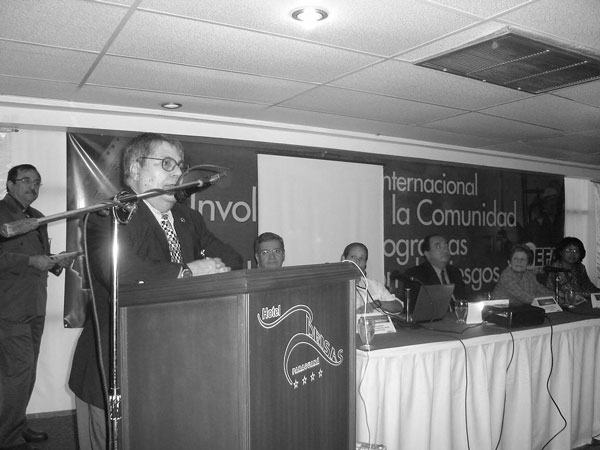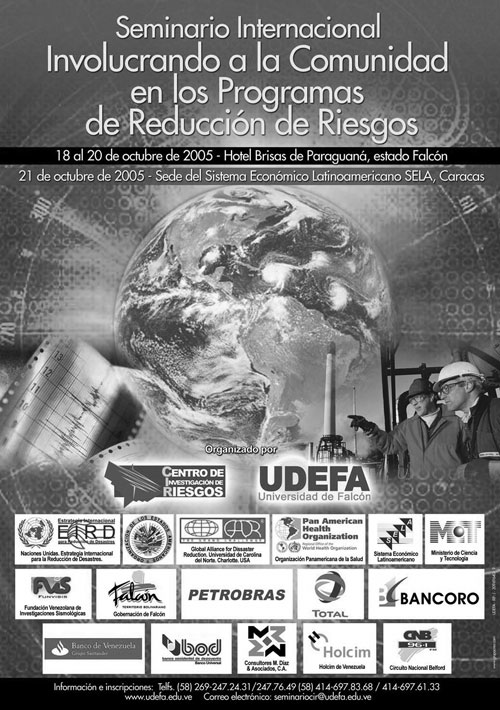

Latin America and the Caribbean
 |
 |
| International
Strategy for Disaster Reduction Latin America and the Caribbean |
Newsletter
ISDR Inform - Latin America and the Caribbean |
 |
|
Partners
in action
|
| Seminar: "Involving
communities in risk reduction programs"
On November 18-20, through its Risk Research Center (CIR), the University
of Falcon carried out a successful seminar in Punto Fijo entitled "Involving
Communities in Risk Reduction Programs.” The event was held in
the context of a United Nations program of activities related to risk
management. As part of the opening program,
the keynote address was delivered by Ms. Nuris Orihuela, Vice minister
of Research and Innovation of the Ministry
of Science and Technology. Her presentation, entitled “The Ministry
of Science and Technology and Risk Reduction Programs”, describe
how the Ministry took into consideration the relevant work done by Venezuelan
universities when it became involved in the field of risk management. |
 |
|
Ms. Orihuela also led a panel concerning the work done by the Ministry and pointed out that, although investment had been made in technology in the past, there was a lack of information dissemination for appropriate decision making. For this reason, a center was created with the purpose of gathering forecasting data with the use of various technologies, including the use of satellites for event simulation, monitoring and control. Colonel Antonio Rivero, National Director of Civil Protection and Disaster
Administration, also participated in the seminar. Colonel Rivero stated
that risk management is not the exclusive responsibility of one specific
organization, but rather should be the ongoing obligation of every single
public official. He emphasized that the Red Cross, fire departments,
enforcement bodies, the armed forces, civil protection organizations
and the population at large should all work together as a team and with
selfless attitudes towards their common goal. The seminar was also
attended by a number of international speakers such as Yukio Aoshima,
former
Director of Urban Management of the local
government of Osaka, Japan, who gave a presentation on the “System
for Coastal Defense and Protection against Floods in the City of Osaka”.
Furthermore, Hugo Vilsink, professor of the University of Delft, the
Netherlands, spoke on “the Risk of Flooding in Protection Dams”. |
 |
|
Omar Dario Cardona, professor of the Institute for Environmental Studies of the National University of Colombia, presented on the experience of his country in community outreach in Manizales. Mr. Cardona delivered the conference entitled “Collective Risk Management: A Framework based upon a Laboratory-City.” In addition, Virginia Garcia Acosta, Director of the Research Center for Social Anthropology Higher Studies of Mexico, addressed the seminar on “Social Risk Construction and Deconstruction.” Among the
Venezuelan specialists invited to the seminar were Alfredo Cilento
Sarli, of the
Institute for Experimental Construction Development
(IDEC), who spoke on “Urban Vulnerability: Resilience Capacity
and the Role of Academia”; Gustavo Malavé, President of
the Venezuelan Foundation for Seismologic Research (FUNVISIS), who lectured
about “Action Projects for Mitigating Seismic Risk in Venezuela”;
and Pedro Bastidas, of the Organization of American States (OAS), who
presented on “The Experience of the Office for Sustainable Development
and the Environment in Involving Communities in Risk Reduction Programs”.
It is worth mentioning that more than twenty other presentations were
delivered. During the closing ceremony, the Rector of UDEFA gave a plaque to Mr.
Juan Murria, Director of CIR-UDEFA, in recognition of the work done in
organizing this seminar and for being the only Latin American individual
awarded the Global Alliance for Disaster Reduction Medal 2005, which
is given by UNESCO. The seminar was attended by more than 300 participants, including professionals, representatives of various companies and students. For additional information, please contact: |
| © UN/ISDR |